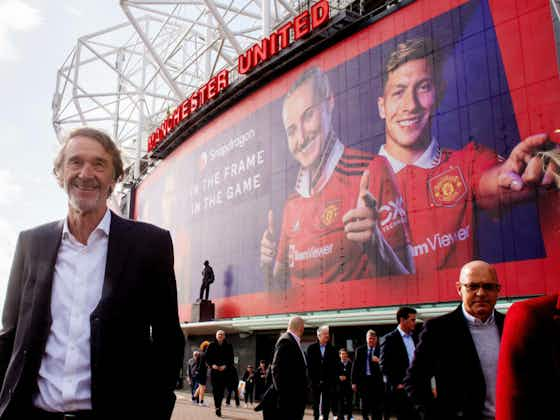EPL Index
·12 February 2025
Ratcliffe’s Financial Overhaul at Man United Sparks Staff Cuts and Fan Backlash

In partnership with
Yahoo sportsEPL Index
·12 February 2025

Sir Jim Ratcliffe’s minority stake in Manchester United, acquired in February 2024, has triggered a sweeping overhaul aimed at addressing the club’s alarming financial trajectory. United, still majority-owned by the Glazer family, have recorded five consecutive full-year losses, last turning a profit in the 2018-19 season. Their 2023-24 accounts reflect a net loss of £113 million (£139.7m), contributing to cumulative losses of £370 million over the past five years.
Ratcliffe’s INEOS executives believe that United requires “right-sizing” to stabilise the club’s finances, suggests a report from The Athletic. This belief has led to drastic measures, including a significant redundancy programme that saw 250 staff lose their jobs in August 2024, following a similar 250-person cull the previous summer. The fourth-quarter financial results for 2024 framed these moves as part of a “club-wide business transformation plan… with the aim of improving operating efficiency via cost-savings, headcount rationalisation and changes to the organisational structure.”
The redundancies span all departments, with United’s staff numbers having risen to an average of 1,112 employees by June 30, 2023. This contrasts sharply with Liverpool’s 1,008 employees and Arsenal’s 723 during the same period. The Athletic reports that this latest wave of cuts will heavily impact the football department, previously spared from earlier layoffs.

Photo IMAGO
A report by consultancy group Interpath Advisory, commissioned by United, emphasised that the redundancies would “unlock operational efficiency with the ultimate goal of improving the club’s financial sustainability and maximising the resources available to improve football operations.” The cost of implementing this programme was £10 million, but the club expects annual savings of between £40-45 million.
However, internal dissatisfaction is palpable. Staff members, speaking anonymously to The Athletic, argue that mismanagement around high-profile decisions, such as the £21 million payout to sack Erik ten Hag and hire Ruben Amorim, as well as the botched appointment of Dan Ashworth, have unnecessarily strained finances. The club’s £200 million summer spending spree on players like Matthijs De Ligt, Joshua Zirkzee, Leny Yoro, and Manuel Ugarte has further exacerbated concerns.
United’s financial woes are compounded by poor on-pitch performances. The team sits 13th in the Premier League, just 10 points clear of relegation after 24 matches, and 14 points behind fourth-placed Chelsea. Missing out on UEFA Champions League qualification will dent revenues, with Adidas set to deduct $10 million annually for each year United fail to secure a spot in Europe’s premier competition. Though there’s still a chance via the UEFA Europa League, the odds are stacked against them.
Adding to the club’s financial strain are self-inflicted wounds. Erik ten Hag’s contract was extended after the FA Cup win over Manchester City, only for him to be sacked nine games into the new season. Dan Ashworth’s brief tenure as sporting director, ending in December by “mutual consent,” cost over £5 million. These decisions highlight a pattern of short-sighted planning that undermines Ratcliffe’s cost-cutting rationale.
Ratcliffe’s cost-saving measures extend beyond staff cuts. Matchday ticket prices have been raised to £66 per game, with concessions for children and pensioners on unsold tickets eliminated. These changes, aimed at ensuring compliance with the Premier League’s profitability and sustainability regulations, have not sat well with fans.
In a letter to fan groups, United stated, “We are currently making a significant loss each year. This is not sustainable. We will have to make some difficult choices. That has included a significant reduction to our workforce as well as cuts across many areas of spend across our club.”
Fan groups have warned of the long-term implications of rising ticket prices, fearing that alienating loyal supporters could further erode the club’s cultural and financial foundations.
Concerned is perhaps the most fitting term for Manchester United supporters grappling with this wave of changes. The redundancies and financial austerity measures seem to be a necessary evil in the face of mounting losses, but the lack of coherent planning behind key football decisions raises alarm bells. Sacking Erik ten Hag so soon after extending his contract, and the costly Ashworth debacle, reflect poorly on the club’s leadership.
Fans will likely view the ticket price hikes as a betrayal, especially when juxtaposed with the lavish summer spending on new signings. The idea of “right-sizing” feels hollow when the club continues to make high-profile, costly missteps. Sir Jim Ratcliffe’s tough decisions might stabilise finances in the short term, but without strategic vision on and off the pitch, United risks further alienating both staff and supporters.
As one staff member told The Athletic, “It feels like we’re paying the price for mistakes made at the top.”
In the end, while Ratcliffe’s reforms might offer a temporary financial lifeline, Manchester United’s long-term future hinges on smarter footballing decisions and rebuilding trust within the club’s ranks and fanbase.


Live





























































